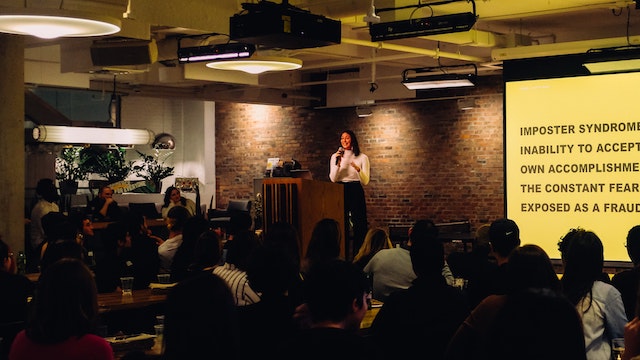Facing fear of public speaking
How to get used to the idea of your first presentation 2020-12-15 #speaking

Fear of public speaking affects everyone, and serves a purpose, but not if it prevents you from doing something that you would otherwise like to do. This results in the catch 22 of public speaking: only public speaking will remove whatever blocks you from speaking in public.
You first need to decide whether you value better presentation skills enough to make it worth working to overcome the fear. Fortunately, even though the fear never goes away for many speakers, you can take enough control of the situation to reduce it.
See also: Speaker Tips – Bootstrapping Conference Speaking, by Trisha Gee
Lower the stakes
Start by lowering the stakes, to diminish your fear. Forget (for now) the big audience at the large conference for experts, where failure might have consequences. Instead, seek out safe-to-fail venues, where ‘failure’ wouldn’t matter. After all, if a meet-up presentation goes badly you won’t fail an exam or get a bad performance review.
Informal meet-ups make a good place to work on a fear of public speaking, because half of the people there want to socialise more than they want to see high-quality presentations. A meet-up you attend regularly also provides a more supportive environment, once you get to know people there. In general, the audience wants you to succeed; they want validation that they chose a good event to attend.
Lean on the organisers
Although the audience will support you, it only takes one asshole to create a bad experience. You don’t have to own this particular problem. Event organisers care more than you do about its success, and therefore your success, so you can expect them to deal with problems that you shouldn’t have to.
Be explicit to organisers about what you want to avoid, in case they happen to like hostile Q&A, say. You can always tell the organisers that instead of taking questions, you will happily talk to people during the break afterwards. By making this an explicit request, you can discover whether the organisers acknowledge your fears or dismiss them. Don’t speak at events whose organisers won’t protect you from bad actors.
Face your insecurities
You will still find other things to worry about: enough slides, interesting slides, your expertise, etc. Unfortunately, many mediocre presenters have enough confidence to give (bad) presentations, while others wrongly question their qualifications and what they have to say. Perhaps the following helps.
- Everyone has something unique and interesting to say
- Event organisers take responsibility for interesting topics
- Most attendees don’t want to present
- Communities usually need more introductory talks
- Experts like it when other people present for beginners
- Q&A rarely works well
- Everyone wants shorter presentations
Once you know what you fear, you can proceed by ‘cheating’: opt out of what you don’t want.
Worst-case scenario
You don’t have to make an all-or-nothing decision about whether to try public speaking. You only need to figure out how to make it possible to do it once. In the worst case scenario you’ll like presenting, and want to do it more often.

